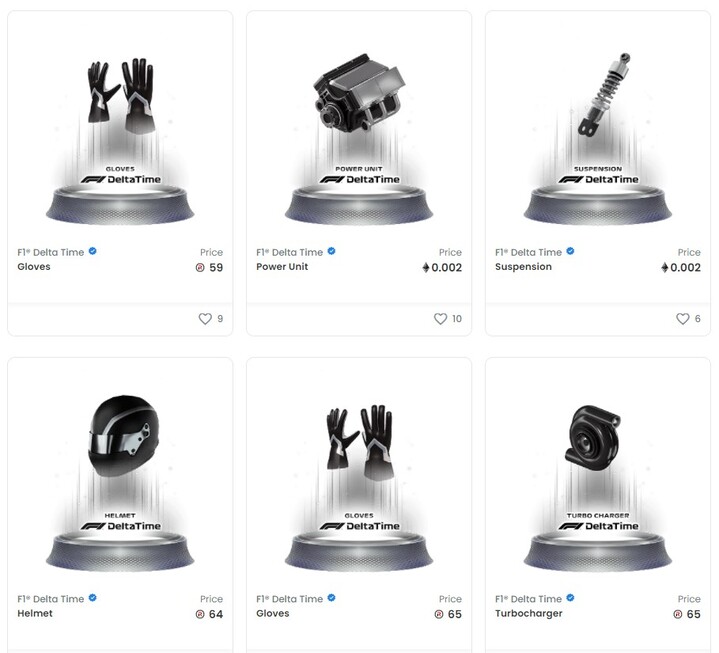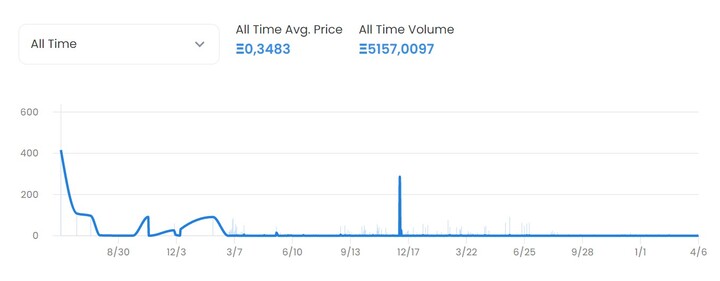F1 Delta Time Shut Down; Players Who Invested in NFTs Left With Nothing
The closure of the game has sparked a discussion on the internet, about combining gaming and virtual tokens.
1

F1 Delta Time debuted in 2019 as one of the first NFT-based games. The title attracted players with the promise of earning tokens for achievements in the gamey. Three years after its release, the developers announced the closure of the game overnight, causing players to lose up to hundreds of thousands of dollars.
The concept was simple and theoretically risk-free. In the game, elements such as cars and drivers took the form of NFTs, or virtual tokens, whose uniqueness gave them value. For many users, the exchange aspect was much more important than the game itself.

On March 15, 2022 Animoca Brands, the company responsible for the title, announced that the game would cease to work.... the very next day. The reason was to be the Formula 1 license, which could not be renewed.
Thus, the collections built by many players over several years in 24 hours became, well... virtually worthless. Of course, the virtual elements of the game still exist despite its closure, but their prices have dropped to zero, and there are far fewer people willing to buy them now.
The developers have offered the victims to exchange their cars for in-game equivalents from REVV Racing and the so-called Race Pass, which is to provide access to new NFTs in the future (hoping that someone will trust them a second time).
How did this even happen?
However, this was not an as unforeseen turn of events as it may seem. For the past 2 years, that is, a year after the game's release, it has experienced a huge drop in player interest.

From the very beginning F1 Delta Time was more of a platform for NFT exchange hiding behind a video game. The gameplay itself resembled free mobile games more than serious racing productions based on the license of one of the most famous racing series in the world.
The promise of being able to earn virtual tokens just for playing the game was also not true. Such an option existed, but it was completely unprofitable, so most purchases were made with real money.
Reactions
On internet forums it is hard to find voices of those aggrieved by this situation. The most numerous group of commentators are Internet users who take the collapse of F1 Delta Time as the ultimate proof of the futility of NFTs, cryptocurrencies and similar solutions.
"It was worthless right from the start, people just didn't know about it," wrote u/Cefalopodul
"So exactly what they were warned about happened. Zero sympathy.
I hope this shuts the mouths of people saying 'you guys don't get it, you own the item and you can use it in another game or sell it because it still has value as NFT, idiots'", criticizes u/Tatsunen
"Sometimes the point of your life is to be a warning to others," noted u/wickerlark
This is how Reddit users comment on the situation. Hundreds of unanimous comments show that Internet users expected the game to end up like that.
NFTs vs. games
However, since 2019, more titles based on NFT have appeared on the market. Titles like The Sandbox or Cryptokitties, still function as popular games for virtual token fans. So does this mean that F1 Delta Time was an unfortunate exception or maybe the beginning of a wave of dying out blockchain games?
One Reddit user - Working-acct - notes:
"It's exactly like skins in a game - when the game closes, they're worthless."
The cosmetic extras in many games can also be obtained through gameplay, but this sometimes costs a lot of effort. For this reason, many people decide to invest in them using real currency. Exchanging items and accounts that can be of great value has also been present for many years in the online gaming world. Maybe NFT games are something that is closer to us than it may seem?
- Top Roblox YouTuber IANROCKS’s channel has been suspended. Other creators are worried, “All my hard work could just get nuked one day, and I’d have to start from scratch”
- YouTuber loses channel to AI error, wins legal battle, but YouTube still ignores him
- Discussion about AI label on Steam continues. “The dev is being punished for their naive honesty”
1

Author: Sonia Selerska
Began her professional writing adventure for Gamepressure.com in 2022, but she has always been interested in all forms of the written word. A student of Film and Multimedia with a specialization in Game Design and Development, deeply follows the blurring boundary between these two worlds. Sometimes, embarrassingly, appreciates style over substance. In the case of media, more often than not, goes to extremes; she can never choose between documentaries and horror films, and cozy games, life simulators, and animations. You will find her playing old-school consoles and indie gems rather than AAA titles. Devotes her free time to her love of fashion and art in a broader sense. Believes that the plot is the most crucial element of a game, and the most compelling stories are the ones inspired by everyday life.
Latest News
- End of remote work and 60 hours a week. Demo of Naughty Dog's new game was born amid a crunch atmosphere
- She's the new Lara Croft, but she still lives in fear. Trauma after Perfect Dark changed the actress' approach to the industry
- „A lot has become lost in translation.” Swen Vincke suggests that the scandal surrounding Divinity is a big misunderstanding
- Stuck in development limbo for years, ARK 2 is now planned for 2028
- Few people know about it, but it's an RPG mixing Dark Souls and NieR that has received excellent reviews on Steam, and its first DLC will be released soon

